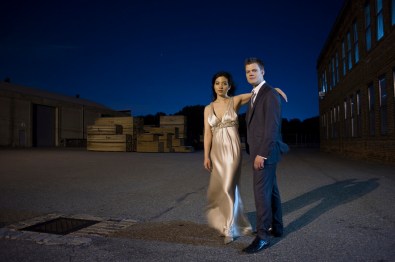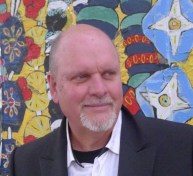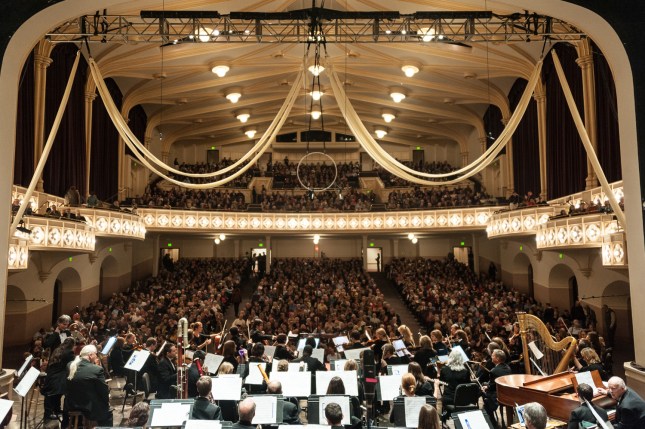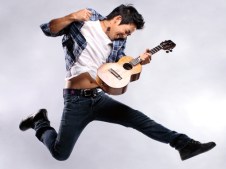2019–20 season, labelled “Let’s play,” features pop elements throughout
By Peter Alexander April 7 at 3 p.m.
The Boulder Philharmonic Orchestra—now officially aka “Boulder Phil”—unveiled their coming season, a new logo, and a new motto at an event for friends and supporters of orchestra Thursday evening, April 4.
 Acknowledging popular practice, the name “Boulder Phil” has been incorporated into the official logo. The logo itself is actually three related symbols, all of them playfully swirling swoops and curls. And in the same spirit, the new motto, for the orchestra and for the season, is “Let’s play.”
Acknowledging popular practice, the name “Boulder Phil” has been incorporated into the official logo. The logo itself is actually three related symbols, all of them playfully swirling swoops and curls. And in the same spirit, the new motto, for the orchestra and for the season, is “Let’s play.”

Jonny Greenwood of Radiohead
All of that reflects the 2019–20 season’s programming, which includes some familiar classical masterpieces and also elements popular in the culture at large and with Boulder audiences: Music by Jonny Greenwood of the alt-rock band Radiohead and by Jon Lord of Deep Purple; the return to the Boulder Phil of the piano duo Anderson & Roe, a Boulder audience favorite since their 2016 performance with the orchestra; a screening of the popular film Raiders of the Lost Ark with the John Williams score performed live onstage; and a concert of “The Music of Queen.”
The mixture of popular and classical ingredients is obvious from the very first concert, titled “Gritty/Pretty” (Oct. 12–13). Two of the works on the program are by Greenwood and Lord, two successful rock musicians who have turned to classical composition. Greenwood has written several orchestral scores for film, including the Academy Award-winning There will be Blood. The Phil will perform a suite from Greenwood’s score for the film, which suggested the “Gritty” part of the concert’s title.

Jon Lord
Lord, who was both a Rock and Roll Hall of Fame inductee and honorary Doctor of Music, was a composer of orchestral scores for more than 30 years, alongside his work with Deep Purple. Boulder Phil music director Michael Butterman says that he heard Lord’s To Notice Such Things, a six-movement suite for solo flute, piano and strings, while driving, and was so taken with the music that he stopped to find out what it was.
Not being up on rock performers, he admits that he thought “who?” when the piece was announced, but he went on to learn about Lord, and the piece, which was written in memory of one of Lord’s close friends. The Phil performance will feature the orchestra’s principal flutist, Elizabeth Sadilek-Labenski.
Also on the same program is Schubert’s Fifth Symphony which, along with Lord’s score, suggested the “Pretty” part of the title.

Anderson & Roe. Photo by Ken Schles.
Other nods to popular music in the program will be obvious: “Raiders of the Lost Ark in Concert” (Oct. 27) and “The Music of Queen” (Feb. 15, 2020) from Windborne Music, the same organization that produced “The Music of David Bowie” for the current season (May 4). Not directly from the pop music canon, but certainly popular with Boulder audiences will be the return of the piano duo Anderson and Roe (Jan. 25), whose highly entertaining performance style captivated Boulder Phil audiences in 2016.
Two pieces on the program will be arrangements by Greg Anderson, half of the duo: Ragtime alla Turca, based on Mozart’s “Rondo all turca” for piano, and Danse macabre bacchanale, based on music by Saint-Saëns. The same program will see Butterman join Anderson and Roe for Mozart’s Concerto for Three pianos, and a performance of Mozart’s joyful “Haffner” Symphony.

Zuill Bailley
Other returning guest soloists during the season will be cellist Zuill Bailey, playing Michael Daugherty’s Tales of Hemingway for cello and orchestra (Feb. 22) and violinist Jennifer Koh, playing Beethoven’s Violin Concerto (April 25). The latter concert will feature two pieces with accompanying visuals. Circuits by Cindy McTee will have visuals by computer graphics artist Aleksi Moriarty; and Alan Hovhaness’ Symphony No. 2, Mysterious Mountain, will have visuals by adventurer-composer Stephen Lias, whose compositions Gates of the Arctic and All the Songs that Nature Sings were premiered by the Boulder Phil in past seasons.

Frequent Flyers Aerial Dance with the Boulder Phil (2013)
Frequent Flyers Aerial Dance will appear with the Boulder Phil for the first time since their joint performance at the Kennedy Center in Washington, D.C. in 2017, providing aerial choreography for the Butterfly Lovers Concerto by Chinese composers He Zhanhao and Chen Gang. The violin solo will be played by the Phil’s concertmaster, Charles Wetherbee.
The concert—rather hopefully titled “Rebirth of Spring”—will be presented March 21 and 22. Other works on the program will be Resurrexit by Mason Bates, Rimsky-Korsakov’s Russian Easter Overture and Stravinsky’s Suite from The Firebird.

Aldo López Gavilan
“Latin Fire & Boléro,” the concert scheduled Nov. 3, will introduce a new soloist to Boulder audiences, Aldo López Gavilán. The Cuban-born composer/pianist will play his own Emporium, a concerto for piano and orchestra, on a program that also features two works by Argentinian composers: Astor Piazzolla’s Tangazo, and Alberto Ginastera’s virtuoso orchestral piece Variaciones concertantes, which assigns each of nine variations to a different solo instrument from the orchestra. Closing out the program will be Ravel’s Boléro.
Other events that will be part of the season will be the annual Nutcracker performances with Boulder Ballet, Nov. 29–Dec. 1; and a new Holiday concert, “Christmas with the Phil,” Dec. 21–23. The latter will feature the Christmas section of Handel’s Messiah, and other seasonal music. Performances will be in more intimate venues than Macky Auditorium, including Boulder’s Mountain View United Methodist Church.
The full 2019–20 season of the Boulder Phil is listed below. Season tickets are currently on sale here.
# # # # #
Boulder Phil 2019–20 Season
All concerts at Macky Auditorium unless otherwise specified

“Gritty/Pretty”
Michael Butterman, conductor, with Elizabeth Sadilek-Labenski, flute
Jonny Greenwood: Suite from There Will Be Blood
Jon Lord: To Notice Such Things
Schubert: Symphony No. 5
2 p.m. Saturday, Oct. 12, 7:30 p.m.
Sunday, Oct. 13, 2 p.m. at Pinnacle PAC
 “Raiders of the Lost Ark in Concert”
“Raiders of the Lost Ark in Concert”
Film screening with live orchestral performance of John Williams’s score
Gary Lewis, conductor
4 p.m. Sunday, Oct. 27
“Latin Fire & Boléro”
Michael Butterman, conductor, with Aldo López Gavilán, piano
Astor Piazzolla: Tangazo
Aldo López Gavilán: Emporium
Alberto Ginastera: Variaciones concertantes
Ravel: Boléro
7 p.m. Sunday, Nov. 3
Nutcracker Ballet by Tchaikovsky
With Boulder Ballet
Gary Lewis, conductor

Boulder Ballet’s Nutcacker. Photo by Eli Akerstein
2 p.m. Friday, Nov.29
2 and 7 p.m. Saturday, Nov. 30,
2 p.m. Sunday, Dec. 1
“Christmas with the Phil”
Gary Lewis, conductor
Handel: Messiah (Part I: Christmas section) and other works
7 p.m. Saturday, Dec. 21, Vilar Performing Arts Center, Beaver Creek, Colo.
2 p.m. Sunday, Dec. 22, Mountain View United Methodist Church, Boulder
7:30 p.m. Monday, Dec. 23, Lone Tree Arts Center, Lone Tree, Colo.
“Anderson & Roe Return!”
Michael Butterman, conductor, with Greg Anderson and Elizabeth Joy Roe, duo-pianists
Gabriel Fauré: Masques et Bergamasques
Mozart: Concerto for Three Pianos, K242
Mozart/Anderson: Ragtime alla Turca
Mozart: Symphony No. 35 (“Haffner”)
Saint-Saëns/Anderson: Danse macabre bacchanale
Saturday, Jan. 25, 7:30 p.m.
“The Music of Queen”
Brent Havens, conductor
7:30 p.m. Saturday, Feb. 15

Michael Daugherty
“Hemingway Portraits & Sibelius”
Michael Butterman, conductor, with Zuill Bailey, cello
Michael Daugherty: Tales of Hemingway
Sibelius: Symphony No. 2
Saturday, February 22, 7:30 p.m.
“Rebirth of Spring”
Michael Butterman, conductor, with Frequent Flyers Aerial Dance and Charles Wetherbee, violin

Mason Bates. Photo by Lydia Danmiller
Mason Bates: Resurrexit,
He Zhanhao and Chen Gang: Butterfly Lovers Concerto
Rimsky-Korsakov: Russian Easter Overture
Stravinsky: Suite from The Firebird (1919)
7:30 p.m. Saturday, March 21
2 p.m. Sunday, March 22, at Pinnacle PAC
“Beethoven & Beyond”
Michael Butterman, conductor, with Jennifer Koh, violin
 Cindy McTee: Circuits, with visuals by Aleksi Moriarty
Cindy McTee: Circuits, with visuals by Aleksi Moriarty
Alan Hovhaness: Symphony No. 2, Mysterious Mountain, with visuals by Stephen Lias
Beethoven: Violin Concerto
7:30 p.m. Saturday, April
Tickets and more information: Five- and six-concert subscription packages are now available; click here or call 303-449-1343. Single tickets go on sale June 1, 2019.











